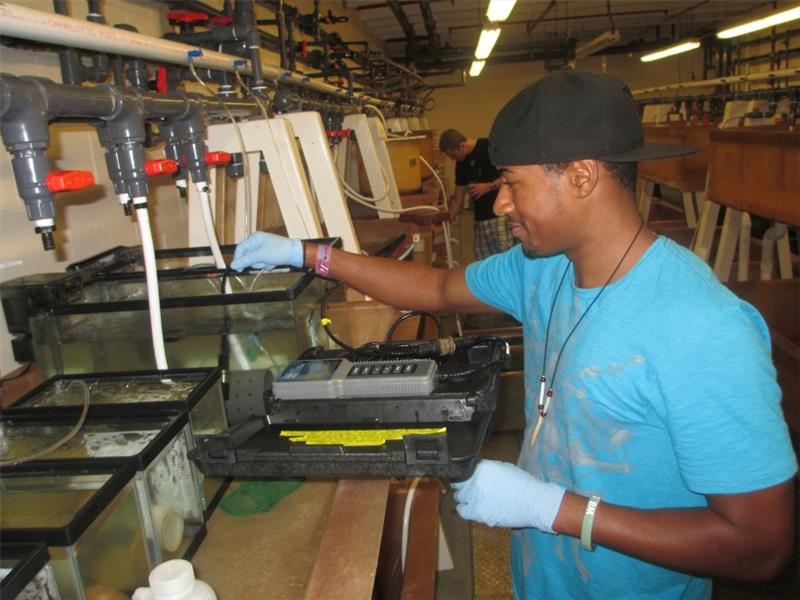
Partnership in Education Program begins 10th year
by NOAA Fisheries 19 May 2018 12:47 UTC

2012 PEP student William Melvin working on research project © NOAA Fisheries
Attracting and retaining a more diverse workforce, one that reflects the changing demographics of the nation and the international community, was the reason for founding the Woods Hole Diversity Initiative in 2004.
One of the projects of the initiative, a consortium of the six scientific institutions in the village, is the Woods Hole Partnership Education Program (PEP), a summer internship program entering its tenth year in 2018.
PEP recruits talent from minority groups that are under-represented in marine and environmental sciences and is aimed at college juniors and seniors who have had some course work in those sciences. Each year, about 16 PEP students have participated in a four-week course focused on global climate change, and then spend six-to-eight weeks on individual research projects, culminating in a public presentation of their research results. Students earn four college credits from the program's academic partner, the University of Maryland Eastern Shore.
A model of diversity
"PEP is a model of diversity -- the seven partner institutions are large and small, public and private, marine and environmental and biomedical," said Georges Liles, director of NEFSC academic programs and PEP. "The students come from all corners of the country, from large research institutions and small colleges, from minority and majority serving institutions, from urban and rural campuses. They come from a variety of cultural and ethnic backgrounds, and bring an impressive range of talents, interests, and previous research experiences. We have matched the 2018 PEP students with an outstanding group of scientists from the various Woods Hole-based institutions, and we are looking forward to the start of PEP's tenth summer."
The 2018 course, "Ocean and Environmental Sciences: Global Climate Change," is taught by research scientists from the Woods Hole science institutions and runs from June 4 to June 29. New this year is a four-day cruise aboard the Sea Education Association sailing school vessel Corwith Cramer. At sea, students will gain experience in oceanographic research techniques and work as active crew members contributing to the operation of the ship, including sail handling and navigation. The remaining six weeks of the internship will be spent on individual research projects under the guidance of a research mentor from one of the PEP member institutions. Each student will share the results of their research in a 15-minute public presentation during a seminar on August 10.
About the students
This year, 17 students will arrive in Woods Hole on June 1 to begin their PEP internship. Many have never heard of Woods Hole before this program. Most learn about PEP through college faculty members or academic advisers, online through searches for summer internships, or by word of mouth and networking. The program provides housing, a food allowance, a stipend, and intensive mentoring and career-building opportunities.
This year's class is the tenth since the program began in 2009, bringing the total number of PEP student participants in the program to 155, hailing from 93 public and private colleges and universities in all geographic areas of the United States. This year, six of the PEP students will have research mentors at NOAA Fisheries Woods Hole Laboratory, six at Woods Hole Oceanographic Institution, four at the Marine Biological Laboratory, and one at the Woods Hole research Center.
Students in the class of 2018 are studying at North Carolina Agricultural & Technical State University; Kentucky State University; North Carolina Central University; University of Maryland Eastern Shore; University of Maryland Baltimore County; California State University, Chico; University of Puerto Rico at Humacao; Rice University; Loyola University Chicago; Norfolk State University; Howard University; or Bethune-Cookman University.
Life after PEP
Many PEP alumni have gone on to graduate school, participated in other programs offered by PEP institutions, or found employment in the marine and environmental sciences field, including positions at Woods Hole science institutions.
Some have returned to PEP in a different capacity. Adrienne George was a member of the first PEP class in 2009. She finished her Ph.D. in biological oceanography in December 2016 at the University of South Florida and is returning for a third summer as PEP student coordinator. In between summers working with PEP, she teaches college biology in Florida.
Kwanza Johnson, a member of the 2016 PEP class, will work with PEP this year as part of her duties as the NEFSC's Academic Programs Coordinator. She received her Bachelor of Science degree from Bethune-Cookman University and is working on a Master of Science degree in Geographic Information Science through Kent State University. She worked most recently as an elementary school teacher in Broward County, Fla. and as a program assistant at the Louis Stokes VA Medical Center in Cleveland.
George and Johnson will join PEP director George Liles, Ben Gutierrez of the U.S. Geological Survey, and Ben Harden of the Sea Education Association to form the team that makes the program run smoothly. Liles also teaches a writing seminar as part of the program. Gutierrez mentors students, recruits instructors and research mentors, and oversees professional development activities for the students. Harden is the PEP course director, and teaches and mentors students.
Ambrose Jearld, founding director of PEP who retired from the NEFSC in 2016, continues to play a role with PEP as a recruiter and mentor, and serves as the Sea Education Association's senior advisor to PEP.
Participating Woods Hole scientific institutions are: NOAA's Northeast Fisheries Science Center, Marine Biological Laboratory, Sea Education Association, United States Geological Survey, Woods Hole Oceanographic Institution, and Woods Hole Research Center.